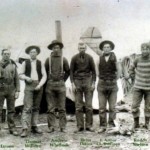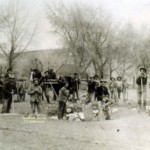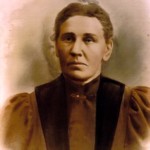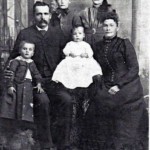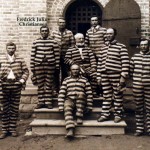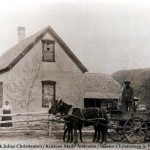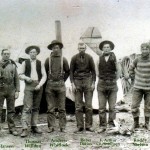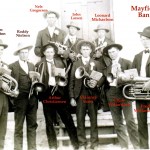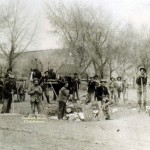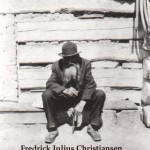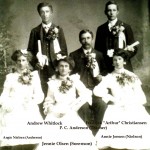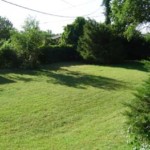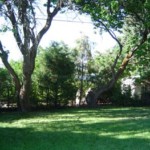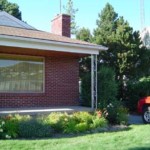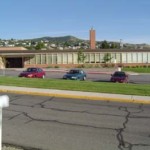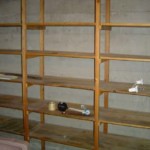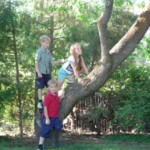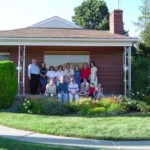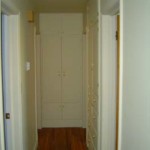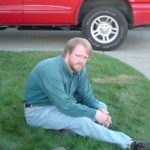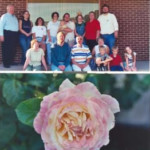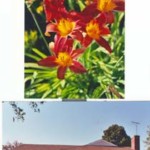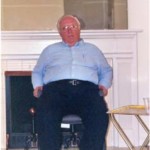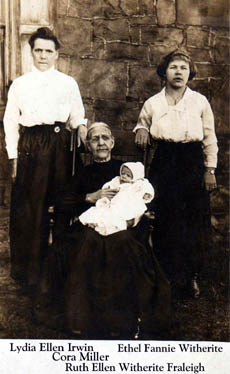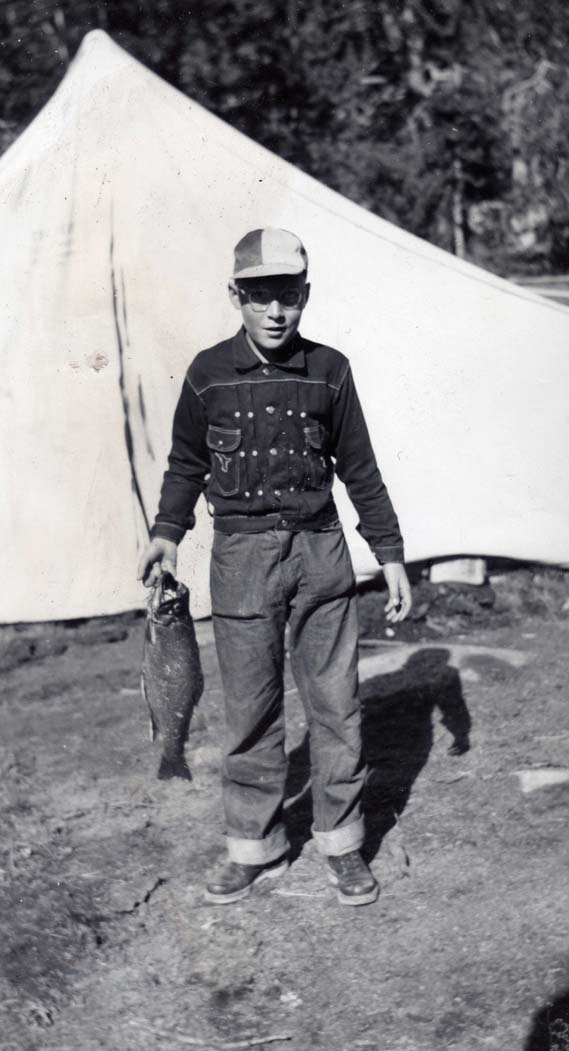Personal History of Frederick Julius Christiansen
(In his own words and spelling)
I was born on the 25th of December 1826 in the city of Huren (believed to be Hjorring), Denmark. I was 5 1/2 yrs old when my parents moved to Voen (Vroe), one and 1/4 mile south of the city. Two years after that they moved to Taars 1 1/4 miles east of the city. I was home and helped work, taking care of cows and sheep, which my parents had a few. I went to school in the winter, from the time I was five til I was 14 years old. Then I went to confermation so was the custom in the Lutheran Church. I than worked home with my father 3 1/2 yrs. I learned to make spinning wheels as my father was a spinning wheel maker. I then hired out to a carpenter and learned the carpenter trade. I worked at that in the summer and made spinning wheels in the winter for a couple of years.
In the spring of 1849 I was called into the army to be a soldier, as there was war with Germany at that time. I was in one engagement. I was sent to Copenhagen on May 20, 1849 to the exercises and was there til July 2, 1849. Then along with the others I was sent to Fyen (Fyn, a large island in Denmark) where I was put in the 2nd Franstennings Jogerioyn 2 company No. 255 (2nd Faar’s Tensknings Jegercorps number 255). We was then on Fyen 3 wks and in Fridericia (Jutland) another 3 wks, than we marched to Copenhagen where we stayed til Christmas, then we marched to Odense on Fyen. I was there 5 months and in Midelfort (Middelfart on Fyn) one month. On July 24, 1850 I was in battle with Istad, we met the enemy and on the 25th I was wounded in my leg, the bullet went to the bone then it flew back and I picked it up and took care of it a while. We drove the enemy back and marched on to the city of Slesvig (Schleswig) then to Danevirke (a protective system of earth works, securing Denmark to the south) where we stayed til February 5, 1851. Then we marched on to Sanederborn (Sonderborg) on the Island of Als, there I was mustered out of Service, then I returned home about 52 Danish miles. I then went to my Master (Minister ?) I. A. Overson and worked with him in the county building houses.
In the summer of 1852 I heard the first truths about the Mormons as Overson had a conversation with 2 traveling Missionaries. He told me some about their conversation and we both believed in it. On the holidays of Christmas I got some more pamphlets to read and study more about it, but my Father was much opposed to it and would have nothing to do with it. I decided to let it alone and have nothing more to do with it. I was troubled in my mind all winter, and I prayed to God frequently that he would bless me with power to do right. One day in April 1853, I together with 18 others was working on some houses to be built when we were to dinner, a Missionary came in and had conversation with us. Three of us decided to go to a meeting the next day which was Sunday and from that day on I went regular to the meetings on Sunday and other times when it was convenient and on June 4, 1853 (also listed as July 5, 1853) I was Baptized by Peter Christian Jensen from Steenboroen Taars who was President of the Taars Branch of the Wensysel Conferens. I kept on working with Overson til November.
I was then sent on a Mission together with Niels Jensen Simonsen to Binsler (Benslev, Tvensted and Ugerby). On the 15 of December 1853 there was Conference in Steenboin where I was sustained as teacher, I with President P. Oteson was sent out to the same place to labor, than another Brother was appointed to labor with me, his name was Gristof (also listed as Gustia), a Swede. We labored together til the 15th of April, 1854. Their was little work to be had that year.
On the 2nd day of May 1854, I got married to Johanna Marie Larsen. We rented a room to live in and on the 13th of August there was a conference in Willstroup and again I was appointed to labor on a Mission together with Jens Christian Jensen, in December he emigrated. I labored after that with the President of the Branch visiting the Saints , holding meetings and acting as Clerk of the Branch. On the 31st of January 1855, I was ordained a Priest and on the 29th of July I was ordained as Elder, and I kept laboring as before.
On the 24th of June 1855 my wife died having been sick for 6 mos. having worked to hard and lifed too much when rolling out (pregnant).
I continued to preach and baptized a few and visited the saints until I emigraded on the 25th of November 1855. I left my home in Taar in Hjorring County and went to Aalborg from there by steamboat to Copenhagen, stayed there three days. I was retained there together with 2 other brothern, we could not get permission to leave the country because we was in the regular service in the army, which was the duty of every man til he was 28 yrs of age. We all had the privilege of being home except of a few that had to be in different cities where the army was stationed to keep peace.
We stayed in town 1/2 day after the company left, according to the councel of the President of the Mission, Brother J. Van Coth. We took passage on the Post mail steamer to Keil where we joined the company. President Canute Peterson was the captain. We took the train to Glyeksad and from there to Grimsley in England by steamer, and by railroad to Liverpool where we arrived on the 5th of December 1855. We got on board a Sail boat (John J. Boy (Boyd)) the same day, we laid there in Liverpool harbor til the 12 of Dec. Then we left Liverpool and was on the Sea 67 days besides the 7 days on the ship in Liverpool. It was very stormy weather most all the time so much so that they could not steer the ship but had to take down the sail and let it go where ever it would. But the Saints felt well and fasted and prayed to the Lord for his protecting hands to be over us. There were 430 (340 ?) Scandinaviaians, 51 British, 41 Italian.
The Saints sang a good deal and trusted in God. But the captain of the ship got so mad that he forbid us to sing. He was a bad man and so was the mate officer of the ship. He whipped the others of the crew with a black snake and used them up so they couldn’t do anything. On the 11th of Jan. 156 a ship that was blown to pieces came near-by and 36 Seamen were on it, they got saved on our ship but the mate whipped them so much they could hardly move when we got to New York. On the 13th of January 1856 I married Kirstine Marie Anderson. The weather kept on very bad, children died and a few old folks in the neighborhood of 60 (age) died. They had measels on board with them.
On the 16th of Feb. we reached New York at Castelgarden (Castle Garden) where we stayed til the 22nd, then we got on the railroad to Cleveland, Toledo, Chicago, Alton, and St. Louis. Some of the emigrants left the company at Chicago and went to Burlington and other places and stopped until they could raise means to go to Utah. The biggest part of the company went to St. Louis, some stopped at Alton. I was among them. I arrived there on the 1st of March and stayed there til the 21st of May. There was a branch of the Church there. The first month I was there, there was no work to be had of any kind on account of a hard winter. The 2nd month there was some work to be had but some took sick on account of different food and climate. I got something in my knees and ankles joints so I couldn’t hardly work. The last month I got more and more work with a carpenter and earned enough to pay house rent and provisions what we used. On the 21st of May we left Alton for St. Louis 20 miles down the Mississippi River. There we joined the company and started from there the next day up the Missouri River for Florence, Nebraska where we arrived May 31st. My wife took sick of chills and fever the day we left Alton and was sick for three weeks.
We came to Florence the 31st of May and stayed until the 27th of June. I worked some of the time with a carpenter, there was plenty of building going on both in Florence and Wmaha (Omaha) 6 miles from camp/ I worked in those two places, before getting ready to cross the plains to the Valley of Salt Lake, and on the 27th of June 1856, we started on the long and tedious journey of one thousand miles with ox team.
I drove a two yolk team of oxen all the way and my wife cooked and washed for one Neils Bengston from Sjelland (Sjaelland, an island in Denmark), and paid him one hundred dollars besides. I had made no arrangements with him or rather he had promised to take me and my wife with him to the Valley. I had paid my way to St. Louis, but there was nothing said about what I should pay or what I should do. All went well with us on the journey. There were several stampeeds on the journey where oxen ran with the wagons as they pleased, the first one was because of some Buffalo Ox came and ran through the wagon train, one young man was killed, his name was Soren Hansen from the Copenhagen Conference. Conute Peterson was a pretty good leader and captain for the company, when we came to Salt Lake City it was said that the oxen of the company was the fattest of all that had yet crossed the plains. He traveled fast where there was little feed, then when we got to good feed, we slowed down and sometimes stopped a day or two and let the oxen rest and eat. One day while traveling by the Platt River I came pretty near loosing myself in the river. We had to go across the river after wood to take with us to kindel fire with, because there were two hundred miles to travel where there was no wood. On the 13th day of August we was to Fort Lormy (Laramie). Monday the 15th of September as we had crossed the Bear River and as we reached the top of a steep hill we met Parley P. Pratt and company. He told us he was going to the states on a short mission, but he never returned because he was killed by a mob.
The next week we arrived in Salt Lake City. On the 20th of September 1856 I got work with two brothers, Olsens and Eric Cast, they were furniture makers. I stayed with them two weeks, until on the 11th of October I came to Brigham City and stayed 1 1/2 years. The first winter I made copper ware which was in great demand at the that time. In the summer I worked for Lorenzo Snow some of the time and making copper ware the other. I and my wife stayed the first 8 days with Jens Christensan Steenboren (also listed as Steenbruen) and worked for him most of the time, but he would not pay us anything only feed us for our labor. We hired a room of Lars Christensen. I got a City lot for nothing and I built a cellar, laid it up with rocks and laid a floor (or Loft) over the cellar, a room to be built on top. We moved into the cellar on the 1st of June 1857 and on the 29th of September our first child was born Johanna Marie. I then sold the lot and improvements on it, for a cow, I got another lot from Lorenzo Snow and built an Adobe house with two small rooms in it and moved into it on the 10th day of October.
That fall, winter and summer there was a good deal of trouble among the people on account of the U. S. Army coming on to Utah to destroy the Mormons. The young men was called to go and meet them at Echo canyon and others to stand guard about the town. Then there was a company called for from Brigham City and there was a call for volunteers from that company. I volunteered to go but was excused if I let my coat go. I had a good overcoat that went and I stayed home because I had started to make Spinning wheels and there was a great need for them for folks was much destitute for clothes and there was nothing to be bought. I worked that winter making Spinning wheels and I with Anders Peterson Busager worked together making copper ware and Spinning wheels. I had to stand guard occasionally. One night Jens Keller and myself had to go about one mile northeast of town to stand guard and see if any would come in from the north. It got to snowing and we could not see anything so we laid down in the snow. We had a couple of quilts along, in the morning we arose there was about a foot of snow on top of us so we had it pretty warm and comfortable.
About the last of March or the 1st of April we got orders to move with south. On the 6th of April my Wife left Brigham City with Peter Madsen (afterwards Bishop of Mt. Pleasant) and went to Salt Lake and stayed a month. I being requested to stay together with others to stand guard and to help make flourboxes and fix up wagons for to move with and last of all to put fire to the town if the army was coming in. I got word from my wife that the cow had strayed away so I got released from duty in Brigham City to go and hunt the cow. I left town on the 24th of April 1858 with Peter Jensen (who afterwards lived in Mt. Pleasant several years).
I came to the city (S. L. C.) the 27th of April 1858 and stayed there to the 4th of may. Then I together with my wife and baby left the city with Peter Jensen he having a Team. We came to Spanish Fork on the 8th of May. There was Neils Bensen living with whom we crossed the plains with. I let him have 556 lbs. of flour with the boxes it was in and the rest I owed I paid to Hans after I came to San Pete. He was a young man who had met Neils Bensen from Denmark. He lived at Mt. Pleasant and moved afterwards to St. George. I could find no work or employment in Spanish Fork. On the 18th of May we left town with Peter Jenson and came to Ephraim, on the 22nd of May 1858.
We came to my old friend Soren Jensen and stayed there with them sometime. I there went to work and fixed my tools and turning lathe, and then made spining wheels which was in great demand here in Ephraim and Manti. The only two places in San Pete at that time was in very poor circumstances for plantery. They had to sell everything they could sell the last two or three years for to get bread. They didn’t raise anything on account of grasshoppers destroying everything. On the 6th of June, I Joined the Elder Quorum (Ordained by Lorenzo Larson) and was a teacher in the Quorum to the 14th of April 1861. I was then ordained a Seventy by Neils Bensen a member of the 46th quorum in the spring of 1861.
I built a house on a city lot in the 4th ward and moved out of the fort and into it. I kept on working at my spinning wheels, furniture, housebuilding, to make roads, ditches, meeting and school houses, and donated some to the St. George Temple and Salt Lake Temple and worked on the Manti Temple and donated some too. I labored as a teacher in the 4th ward most of the time till I moved. On the 16th of July 1874 Kristine Marie Jensen was Sealed to me. Her former husband Soren Jensen had apostised and gone back to the states a few years before. On the 21st of November 1856 we had our indoulments (endowments) in the indoulment house in Salt Lake City and I had my wife Johanna Marie Larsen sealed to me who died in Denmark and also my wife Kristene Marie Anderson.
In the spring 1877 I bought a farm in Mayfield and moved some of my family there and in 1878 I moved the rest of my family. I was called to act as teacher and part of the time as head teacher in the 1st ward. I was also called to act as school trustee for 2 years.
On the first of April 1883 I was called to go to Scandinavia on a Mission. I left Salt Lake City on the 11 of April 1883 and arrived in Copenhagen on the 2nd of May 1883. I was assigned to labor in the Aalborg Converens. I was traveling in Hjorring branch until the 14th of October 1884. There was very few baptized at that time, the people were so predjust at that time. There were so many different demonations and they believed the one was as good as the other. I arrived home on the 12th of November 1884, had a very pleasant time of it coming home and had a good time of it all, all the time. I enjoyed not the very best of health the climate was so different from what I was used to here in Utah.
After I came home I was called to act as teacher again and I was also called to act as first assistant to the supertendent of the Sunday School. On the 16th of February 1885, I was set apart to be one of the Presidents of the 65th quorum of the Seventies. I held that position until the 28th of October 1894. I was ordained a High Priest October 28, 1894 by Henry Beal. At that time the first council of Seventies asked the old men of the Seventies to go to the High Priest Quorum and let the young men take their place, for that reason I resigned.
In the summer 1888 I was looked after by Marshel Rasmus Clausen pretty close. He wanted to take care of me because I married too much. I was arrested and had to meet in Provo in the District Court on the 29th of September 1888. I was sentenced to go to the pen for 4 months and pay 50 dollars and it cost 45 dollars. I got into the pen on the 9th of October and out of it on the 20th of January 1889, that was for polygamy. I had another charge against me for Adultry, for which I had to give bond of $500.00 while I was in the pen. I had to meet in court again on the 5th of February 1889, but that charge was dismissed because there was no evidence. There was at that time 188 brothern in the pen. There were five for Polygamy and cohabitation, G. C. Wood, Woodscross, for 5 years 3 months and $888.00; J. H. Thurber, Grass Valley, 4 years 6 months and $700.00; H. Murdock, Ogden, 5 years and $500.00; Fraughth Sumff, 2 years; John Berger, 3 years.
After I was at liberty again in 1889, I labored then as a teacher in the Ward and in the Sunday School and in the Council of the 65th Quorum of Seventies until the 28th of October 1894, then I was ordained High Priest by Henry Beal. Then taking care of my farm and doing some carpenter work. I kept on working in the ward and Sunday School and I was released on account of old age.
I had great interest in the work of Salvation for the dead. On October 4, 1872 my wife and myself were baptized in the endoulment house for some of our dead relation and again on the 2nd of October 1872 we together with our daughter Hanna was there again and was baptized for some more. On the 12th of July 1998 I was in the Manti Temple the first time. After that I was there several times every year until 1912. Then for 4 years I was there every day that the temple was open from April until November together with some of my own and wifes ancestories, to the end of the year 1916. I have been to the temple 269 to be endowed and several times to have Baptisms done.
On the 25th of December 1916 I am 90 years old. I have at that time twenty-one children, 14 living and seven dead, 106 Grand children, 84 living and twenty-two dead, 70 Great Grandchildren, 58 living and 12 dead.
This History taken from records in the possession of Merlin H. Christiansen, Emery, Utah and Mary K, Christiansen, Emery, Utah and other source of unknown authorship.
This account compiled August 1993 by Ray G. Christiansen


